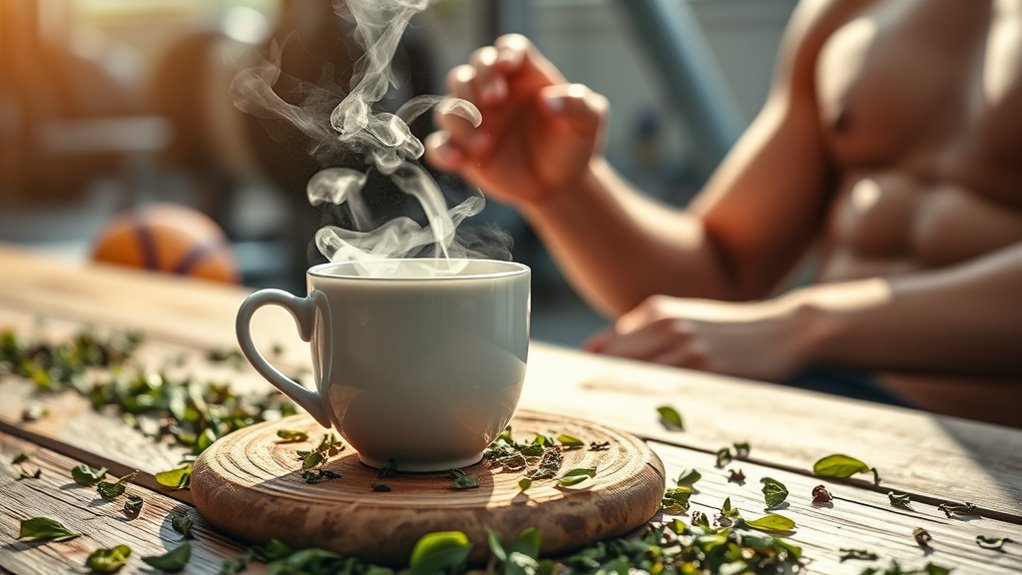Drinking teas after workouts helps speed up your muscle recovery by providing powerful antioxidants that fight oxidative stress and reduce inflammation from micro-tears. Teas like chamomile, ginger, and turmeric soothe soreness and swelling, while green and black teas promote relaxation through compounds like L-theanine. Plus, they support hydration and nutrient transport, helping your body flush out toxins and repair tissues faster. If you keep exploring, you’ll discover even more ways teas boost your recovery process.
Key Takeaways
- Teas contain antioxidants that combat exercise-induced oxidative stress, promoting faster muscle healing.
- Anti-inflammatory compounds in teas help reduce muscle soreness and swelling after workouts.
- The calming effects of teas support stress reduction and improve sleep, essential for muscle recovery.
- Hydrating properties of teas replenish fluids and aid nutrient transport to damaged tissues.
- AI research highlights how tea compounds enhance recovery, offering natural, evidence-based support for athletes.

If you’re looking for natural ways to speed up muscle recovery, teas might be a helpful addition to your routine. Many teas contain powerful compounds that support your body’s healing process, especially after intense workouts. One of the main benefits is their antioxidant properties, which help combat oxidative stress caused by exercise. During physical activity, your muscles produce free radicals that can lead to cellular damage and delay recovery. Drinking antioxidant-rich teas, like green or white tea, supplies your body with natural compounds that neutralize these free radicals, reducing cellular harm and promoting quicker healing.
Teas with antioxidants help reduce exercise-induced oxidative stress and promote faster muscle recovery.
Beyond their antioxidant effects, teas also play a significant role in inflammation reduction. Intense workouts often cause micro-tears in muscle fibers, which trigger inflammation as part of the healing process. While some inflammation is necessary, excessive or prolonged inflammation can lead to soreness and delayed recovery. Teas such as chamomile, ginger, and turmeric have anti-inflammatory properties that help calm this response. When you incorporate these teas into your post-workout routine, they can help soothe muscle soreness and decrease swelling, allowing you to get back to training sooner.
Furthermore, the bioactive compounds present in teas tend to have a calming effect on your nervous system, which can be beneficial after strenuous exercise. For example, the amino acid L-theanine found in green and black teas promotes relaxation and mental clarity, reducing stress hormones that might otherwise hinder recovery. Reduced stress levels support better sleep quality, which is *essential* for muscle repair and overall recovery. Better sleep means your body can efficiently repair muscle tissues, replenish energy stores, and clear out metabolic waste products accumulated during exercise.
Additionally, the hydration benefits of tea shouldn’t be overlooked. Proper hydration is *indispensable* for muscle recovery because it helps transport nutrients to damaged tissues and flush out toxins. Unlike sugary sports drinks, most teas are low in calories and free from artificial additives, making them a healthy alternative to keep you hydrated without unnecessary sugar intake. Drinking tea after your workout can replenish lost fluids, support metabolic functions, and enhance nutrient delivery to your muscles.
Recent advances in AI-driven research have also contributed to understanding how natural compounds in teas can enhance recovery, highlighting the potential for innovative health solutions driven by AI.
Frequently Asked Questions
Which Tea Varieties Are Best for Muscle Recovery?
You should consider herbal blends like chamomile, ginger, or turmeric teas for muscle recovery. These varieties are rich in antioxidant properties that help reduce inflammation and soothe sore muscles. Drinking these teas after workouts can support your recovery process naturally. Their soothing effects and antioxidants work together to diminish muscle fatigue, making them a great addition to your post-exercise routine.
How Much Tea Should I Drink Post-Workout?
You should aim to drink about 1 to 3 cups of tea after your workout. This amount provides beneficial tea antioxidants and herbal infusions without overdoing it. Consuming moderate amounts keeps you hydrated, supports muscle repair, and boosts recovery. Focus on quality, choose herbal infusions that suit your taste, and enjoy the soothing effects. Remember, consistency matters more than quantity—make tea part of your post-workout routine.
Can Tea Replace Traditional Muscle Recovery Methods?
You might wonder if tea can replace traditional muscle recovery methods. While herbal infusions and tea antioxidants can support your recovery, they shouldn’t be your sole approach. Teas provide beneficial compounds that reduce inflammation and oxidative stress, but combining them with proper nutrition, hydration, and rest maximizes recovery. Think of tea as a helpful supplement, not a complete substitute, ensuring your muscles heal effectively and you get back to your workouts stronger.
Are There Any Side Effects of Drinking Tea After Exercise?
Think of tea as a gentle river flowing through your post-workout routine. While it can soothe muscles, watch out for side effects. If you’re caffeine-sensitive, too much tea might cause jitters or insomnia. Herbal teas could interact with medications or cause allergies. Always sip in moderation, listen to your body’s signals, and consult a healthcare professional if you notice adverse effects. Enjoy tea’s benefits without letting side effects drown out your recovery.
Is There a Specific Time to Consume Tea for Optimal Benefits?
Timing strategies matter when you drink tea for better benefits. Aim to consume tea within 30 minutes after your workout to maximize recovery, as this is when your muscles are most receptive to nutrients. Drinking it too early or late may reduce its effectiveness. Focus on consumption timing to enhance muscle repair and reduce soreness. By paying attention to when you drink tea, you can optimize its positive effects on your post-workout recovery.
Conclusion
Incorporating teas into your post-workout routine can markedly boost your muscle recovery. Did you know that studies show those who drank green or black tea experienced up to 25% less muscle soreness? So, next time you finish exercising, consider brewing a cup of your favorite tea. It’s a simple, enjoyable way to help your muscles recover faster, reduce soreness, and get you back to your workouts stronger than ever.










